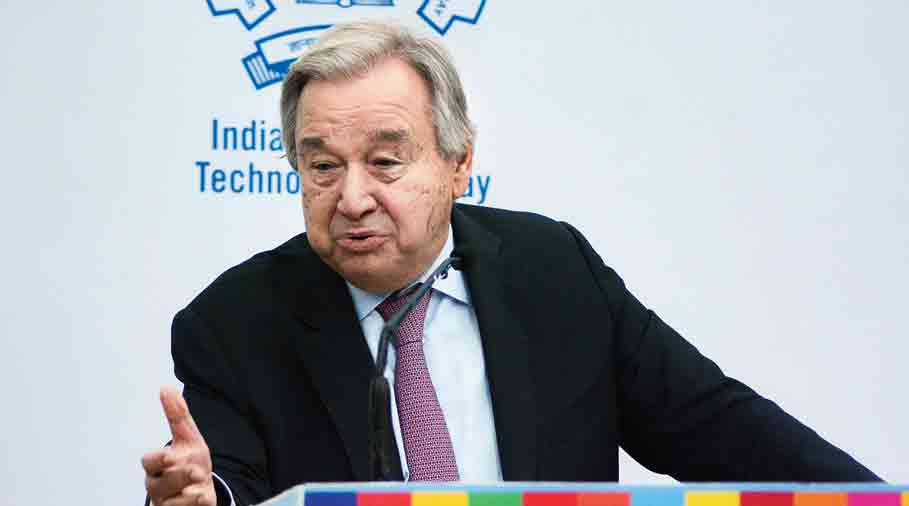Amid a fresh warning of a looming climate crisis, the UN chief on Monday called on the biggest greenhouse gas emitters — a list that includes India — to accelerate efforts to reach net-zero emissions by 2050, or 20 years ahead of India’s pledged 2070 target.
Antonio Guterres, the UN secretary-general, proposed to the G20 nations a "Climate Solidarity Pact" in which all big emitters would make “extra efforts” to cut emissions and wealthier countries would mobilise finance and technical resources to help emerging economies to curb global warming.
His call for accelerated action by all countries came at the release of a fresh report from the UN Intergovernmental Panel on Climate Change (IPCC) on Monday underlining the urgent need for immediate action to keep global warming below 1.5°C to avert its most dangerous impacts.
The report has cautioned that even if the emissions of Earth-warming greenhouse gases peak by 2025 and decrease by 43 per cent by 2030, the 1.5°C threshold will most likely be breached in the decades to come. The warmer temperatures will mean more droughts and floods, more intense cyclones, greater threats from sea level rise to people and infrastructure along coastlines, as well as more frequent extreme weather events that could worsen food insecurity.
At the 1.5°C level of global warming, some 950 million people across the world’s drylands will experience water, stress, heat stress and desertification, while 24 per cent of the global population will be exposed to flood risk. Heatwaves that, on average, occurred once every 10 years will likely occur four times more frequently under a 1.5°C global warming.
But the IPCC report — a summary for policymakers that synthesises the findings of earlier reports — also said there is a “rapidly closing window of opportunity to secure a liveable and sustainable future for all” through urgent climate action.
Guterres, in his speech, said the IPCC report is a “how-to guide to defuse the climate time bomb".
He said leaders in developed countries must commit to reach net-zero emissions as close as possible to 2040 and leaders in emerging economies must commit to reaching net zero as close as possible to 2050. Net-zero is a state in which a country produces only as much of emissions as it neutralises or removes.
Experts said the call could be interpreted as an appeal to India to try and advance by 20 years its pledge to achieve net-zero emissions by 2070 — announced by Prime Minister Narendra Modi at a UN climate summit in Glasgow in 2021.
“Advancing India’s net-zero commitment from 2070 to 2050 may seem challenging, but it is possible with the right policies and technology in renewable energy and low-carbon technologies,” Annapurna Vancheswaran, managing director of the Indian programme of The Nature Conservancy, a global environmental organisation, told The Telegraph.
India has already made significant progress in this direction, Vancheswaran said. The country’s renewable energy capacity has increased 396 per cent over the past eight years and stands at 174 gigawatts or about 42 per cent of its total energy capacity in February 2023.
A study by The Nature Conservancy has suggested that degraded wasteland with low biodiversity and livelihood value and converted lands across India have a potential capacity of 1,780 gigawatts of renewable energy or four times the 500 gigawatts pledged by India as part of its climate actions.
India has committed to lowering its emissions as quickly as possible but on the condition that the developed countries —historically, the biggest emitters — provide financial and technical resources.
"Climate justice is crucial because those who have contributed least to climate change are being disproportionately affected,” said Aditi Mukherji, director of the International Water Management Institute in India and one of the 93 authors of the report.
“Almost half of the world’s population lives in regions that are highly vulnerable to climate change. In the last decade, deaths from floods, droughts and storms were 15 times higher in highly vulnerable regions,“ she said in a media release.
The IPCC report has also underscored this need for a dramatic increase in climate finance. Developing countries will, for example, need $127 billion per year by 2030 and $295 billion per year by 2050, the World Resources Institute, a US-based climate group, said outlining the IPCC findings.
While the report does not assess countries' needs for finance to avert, minimise and address the loss and damages from climate impacts, recent estimates suggest they will be substantial in the coming decades, the WRI said in a media release.











